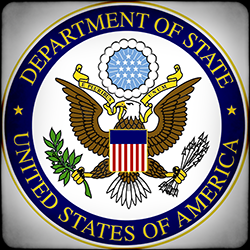Though it's been overshadowed by subsequent executive orders on various aspects of immigration, President Trump's federal hiring freeze announcement last week may actually encourage illegal immigration at a time when his administration is supposedly trying to enhance border security. The freeze exempts jobs deemed "necessary to meet national security or public safety responsibilities," but it appears that State Department employees who screen visa applications around the world won't be part of this national security exception.

As a former Foreign Service Officer (FSO) with significant visa-related experience, I can confirm that new hires are critical to effective screening efforts. The vast majority of visa adjudication at embassies and consulates around the world is done by entry-level officers. In fact, FSOs aren't even eligible for tenure until they have completed a required consular tour.
What happens when posts are short-staffed? Visa applicants don't stop coming. Instead, fewer people spend less time reviewing applications. Less scrutiny means less fraud detection, less employment verification, and fewer validation studies to determine how many are overstaying visas. In my career, I saw the positive impact of robust staffing and the negative impact when there were staffing gaps. At times when we were fully staffed and had the resources to conduct fraud investigations, we were able to make better decisions and keep people out who didn't qualify based on the law. But at times when we were short-staffed and overwhelmed with applicants, I'm equally certain that we let people slip through who never should have received visas. (And, to a lesser extent, probably rejected some applicants who should have been approved.)
As it moves forward with plans to build the wall, the Trump Administration cannot forget that the border is only half the (illegal immigration) problem – visa overstays are the other half. I have long argued that the visa function should be taken away from the State Department because I think it would make more sense to let diplomats focus on diplomacy and let law enforcement officers (perhaps from DHS or a newly created agency) focus on enforcing our immigration laws overseas. But until that happens, entry level FSOs should be part of the national security exception in the hiring freeze because what they do absolutely impacts our national security and the integrity of our immigration system.
Instead of starving the State Department of new Foreign Service hires, why not try the following:
- Create more dedicated fraud prevention officer jobs at high fraud posts around the world and at DHS stateside. Fraud detection is labor intensive – you can issue executive orders or pass any new laws to combat visa and citizenship fraud but without the manpower to enforce them, they'll be meaningless.
- Initiate a review of non-immigrant visa (NIV) processing around the world, with a particular focus on posts with low tourist visa refusal rates, like Mexico (23 percent), Russia (9 percent), Turkey (13 percent), Philippines (27 percent), China (12 percent) and others. In instances where there's a pattern of visa issuances incompatible with U.S. law – which is actually quite strict when it comes to tourist visa issuance – directives should be implemented to ensure compliance with the law.
- Point eight of Trump's ten-point immigration plan is to "Ensure that a biometric entry-exit visa tracking system is fully implemented at all land, air, and sea ports." Amen to that, but simply having this tracking system isn't enough. Historically, FSOs adjudicating visas haven't even had access to the (limited) entry/exit data DHS has. And so it's absolutely essential that any entry/exit tracking data be shared with State, so that when FSOs are conducting a visa interview, they can see how much time the person has previously spent in the U.S. before renewing (or denying) their visa request.
- Grant all visitors from non-visa waiver countries no more than a 90-day stay, as opposed to the 180-day stay DHS typically grants now (with extensions in rare circumstances). Granting nearly all visitors six months and allowing them to apply for six-month extensions of up to 18 months allows so-called tourists too much time to live and work (illegally) in the U.S.
